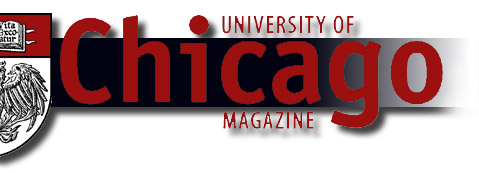 |

Psychology
professor appointed master of social sciences
John Lucy says he plans to keep class sizes small and make the
core curriculum “run more smoothly.”
John Lucy, PhD’87, professor in psychology and the Committee
on Human Development, has been appointed to a three-year term as
master of the Social Sciences Collegiate Division, deputy dean of
the Division of Social Sciences, and associate dean of the College.
His new roles include acting as a coordinator between the College
and the Social Sciences Division, as well as overseeing curricular
changes in the social sciences and civilization studies departments.
Lucy replaces political scientist Stephen Walt, now a professor
at Harvard.
Lucy, the first former William Rainey Harper instructor to become
a master in the College, has conducted research as a fellow at the
Netherlands’s Max Planck Institute for Psycholinguistics, and
has studied cognitive development in Yucatan, Mexico. He served
as resident head of various houses for eight years, first as a doctoral
candidate in the Committee on Human Development and later as a Harper
instructor from 1987 to 1989. Lucy then taught at the University
of Pennsylvania before returning to Chicago in 1996.
Assuming leadership of the division amid the College’s expansion
plans and curricular changes, Lucy says that his intentions lie
firmly in the students’ best interests: “If you live with
students for eight years and teach them full time for two years,
with nothing else to do but that, quite clearly you have a sense
of the College mission and what undergraduates are like.” Though
his new position doesn’t require teaching, he looks forward
to leading one core course and one graduate course each year.
Regarding concerns about the possibility of larger classes, Lucy
says that “there’s an absolute commitment to keeping core
classes at 25 or less.” He notes that sections will be kept
small by appointing new faculty and hiring additional Harper-Schmidt
instructors and graduate lecturers, in roughly the same proportions
that exist now. “It’s entirely in our interest to remain
highly interactive with students,” he says. “There’s
something about a close discussion that a large lecture class with
200 students does not have. Even if you tape that discussion, it
never quite captures what it’s like to be sitting in the middle
of it.”
Lucy does not foresee any fundamental changes in the social-sciences
curriculum during his term. “My job is to make the core even
more interesting for the faculty, and even more rewarding for the
students,” he says. “I’d like to simply take what
we’ve got, and make it run more smoothly.”
Under the new Chicago Plan, effective this fall, the social-sciences
core remains a three-quarter requirement. For incoming students
who have little background in the social sciences, the core should
serve as an introduction to fields they may not have considered,
says Lucy. “The social sciences core is an opportunity for
students to try out a new area that’s both scientific and humanistic,
and can therefore represent for some people a perfect balance between
the two,” Lucy says. Lucy also plans to keep the core’s
emphasis on preparing students for advanced work. “That way,”
he says, “the faculty brings the undergraduates up to the level
that the advanced courses require, rather than having to simplify
those courses for the undergraduate.”—E.C.
|



